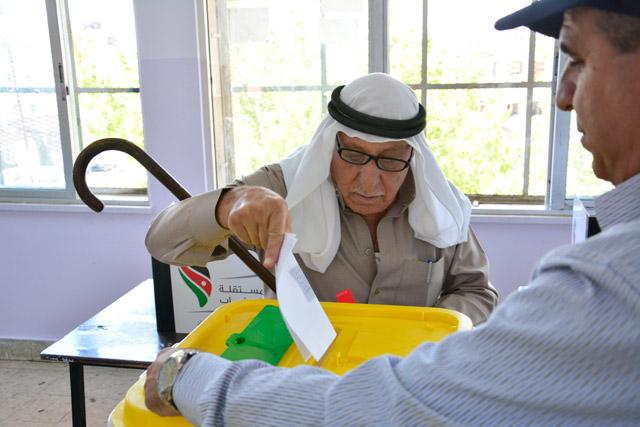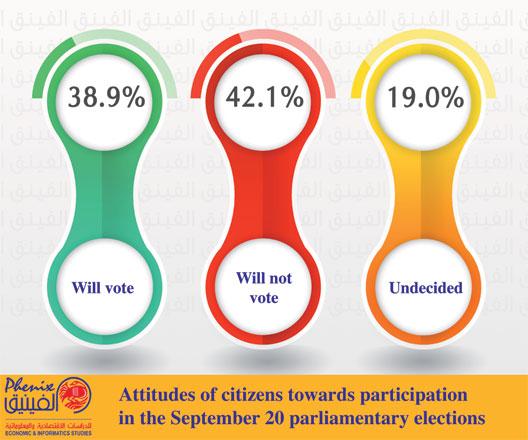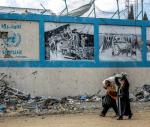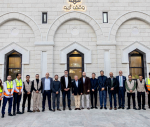You are here
Less than 40% of Jordanians plan to vote on Tuesday — poll
By Khetam Malkawi - Sep 17,2016 - Last updated at Sep 17,2016

AMMAN — Only 38 per cent of Jordanians plan to vote in the parliamentary elections on Tuesday, according to an opinion poll released on Saturday.
The poll, conducted by the University of Jordan’s Centre for Strategic Studies (CSS), found that 39 per cent of Jordanians surveyed said that they would not vote, while 11 per cent said they might.
The poll, which surveyed 1,812 members of the public of voting age, as well as 700 opinion leaders, was conducted 100 days after the formation of Hani Mulki’s government.
The number of eligible voters for this year in the Kingdom is 4,139,730, 52 per cent of whom are women, according to official figures.
Electoral participation was found to be higher among opinion leaders, 72 per cent of whom said they planned to vote, while 13 per cent said they would not take part.
Among members of the public, the lowest interest in elections was found in Zarqa, 22km east of Amman, where 48 per cent of people surveyed said they would definitely not vote and only 27 per cent said they definitely planned to use their ballot.
Zarqa is the third most populated governorate in the Kingdom, with 1.364 million, after Amman and Irbid respectively.
According to the poll, the highest voter turnout is likely to be in the northeastern governorate of Mafraq, where 63 per cent of respondents said they would definitely vote, compared to 34 per cent who said they would definitely not participate.
Mafraq, which has been hit hard by the Syrian refugee crisis due to its proximity to the border with Syria, has a population of 549,948.
In Amman, which has a population of 4 million, 35 per cent of the respondents said they would definitely vote, while 42 per cent said they would not.
Voting is more popular among the older generation; some 45 per cent of voters aged over 45 plan to vote, compared with 31 per cent in the 18-34 age bracket, the study said.
Among the younger group, 46 per cent said they would definitely not go to the polls.
Concerning voter choices, the highest proportion (24 per cent), said they would select the candidate who offered them a service.
Meanwhile, 12 per cent said they would consider the candidate’s religious commitment and transparency, while 11 per cent will look for courage and the ability to hold the government to account and 10 per cent said they would vote for a candidate from their tribe.
Only 1 per cent of Jordanians surveyed said they would vote for a candidate based on his or her political affiliations or involvement in political parties, while 8 per cent said they will base their decision on the candidate’s platform.
As for the Independent Election Commission, 45 per cent of the national sample said the commission was able to conduct transparent and fair elections, while 38 per cent disagreed.
Fifty-one per cent of the respondents in the national sample and 69 per cent of the surveyed opinion leaders said they are confident the elections will be free and fair.
Under the Elections Law, voting is based on the open proportional list at the governorate or constituency level. The law also stipulates that each list should include no fewer than three candidates and no more than the number of seats allocated for the constituency in which the list is competing.
The final number of candidates running in the upcoming parliamentary elections stood at 1,252 candidates after the deadline for withdrawal from the race.
The Kingdom is divided into 23 electoral districts, with five for Amman, four for Irbid and two for Zarqa.
The other governorates are each represented as an electoral district, including the three badia constituencies.
The law reduced the Lower House seats from 150 to 130, designating 15 seats for the women’s quota.
Related Articles
AMMAN — Voting for the decentralisation and municipal elections concluded late Tuesday night with a 31.7 per cent voter turnout rate of some
AMMAN – The Phenix Centre for Economic and Informatics Studies has polled Jordanians on their attitudes to participating in the September 20
AMMAN — Thousands of young Jordanians have joined an alliance to monitor the election promises of candidates in the upcoming parliamentary p


















